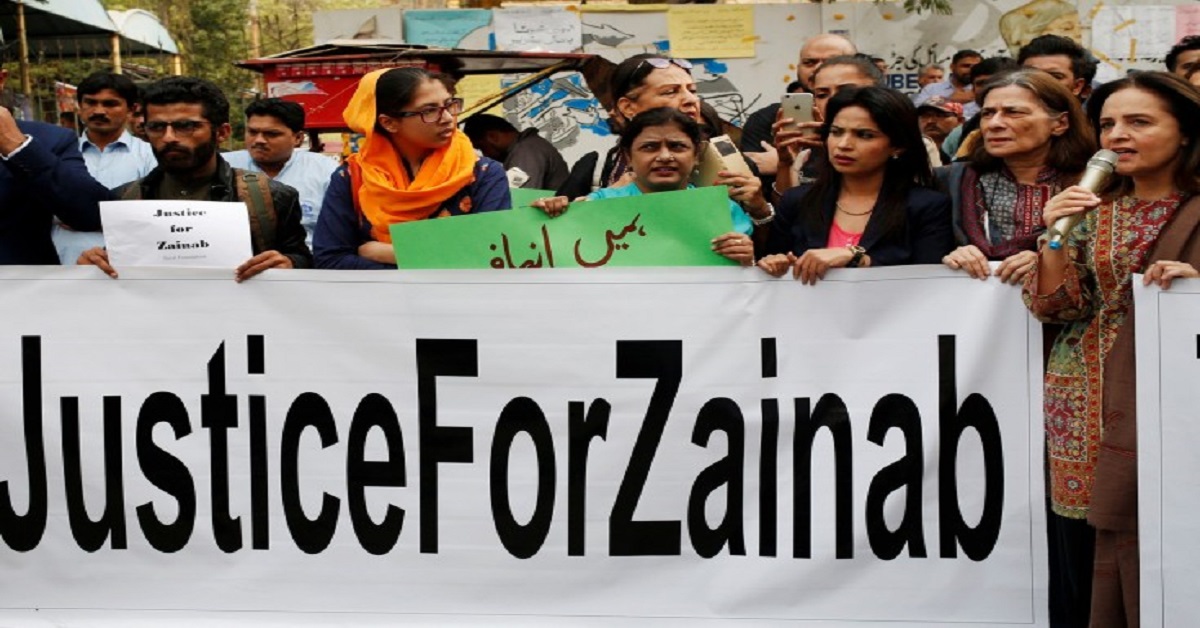
The death of Zainab had caused an uproar in Pakistan. But is this the first case of such brutality? Or were there more? Will it continue?
The rape and murders of a dozen children by a suspected serial killer have terrified parents in central Pakistan, and prompted soul-searching over how the country fails to protect its most vulnerable.
The killing of six-year-old Zainab Fatima Ameen became the tipping point last week when her body was found on a rubbish heap near her home in the city of Kasur.
Candlelight vigils were held across the country and the hashtag #JusticeForZainab trended on social media, with celebrities, opposition politicians and outraged web users demanding action.
But grief spilt over into anger in Kasur, a city already infamous for child abuse after a massive paedophilia ring was exposed in 2015.
Zainab, officials said, is the 12th child found raped and murdered in the city within a two-kilometre radius in the last two years.
The discovery of her body sparked riots in Kasur, with thousands swarming police stations and setting fire to politicians’ homes, accusing authorities of inaction.
At least two demonstrators were killed after police opened fire on the crowds.
A spokesman for the government of Punjab province — where Kasur is located — said the suspect was likely “a lunatic with psychological disorders”.
“The perpetrator involved in the murder is a serial killer,” Malik Mohammad Ahmad Khan told an international news agency.
In six of the cases, investigators have found the same DNA, Kasur district hospital chief Dr Nazir Ahmad told the news agency.
Another doctor said the bodies of the children bore similar injuries.
Dr Fareed Khan said the victims showed signs of “strangulation, burn marks, scarring and wrist cuts.”
Television stations have repeatedly broadcast chilling CCTV footage purportedly showing the young girl walking hand-in-hand with an unidentified male in what may have been her last moments.
READ ALSO: Pakistan violates ceasefire again; one Jawan killed
Kasur is notorious for such heinous crimes.
In 2015, officials uncovered a huge paedophilia ring in the city. At least 280 children were sexually abused on camera by men who later blackmailed their families, threatening to leak the footage.
Police conspicuously failed to act despite pleas from parents, only making arrests after clashes between relatives and authorities dragged the issue into the spotlight.
From January to June 2017, there were 129 cases recorded in Kasur — including rape and murder — according to Sahil, an aid group that works on child protection issues.
Parents interviewed by the news agency appeared overwhelmed once again by their powerlessness.
“The district police chief told us if they can’t arrest the culprit then what can they do,” said Mohammad Ayub, whose eight-year-old niece was raped and killed in July last year.
Just one child is believed to have survived an attack.
The six-year-old girl has spent months in intensive care, paralysed from the neck down and unable to speak after being raped, tortured and left for dead at a garbage dump in November.
“Cameras should be installed in the streets on every turn for protection of the children… how can mothers accompany their children all the time?” asked the survivor’s aunt.
“How can I be satisfied… we don’t know what’s happening,” raged Zainab’s father Ameen Ansari at his home, where he blasted the police for inaction.
“They have not shown any interest at all.”
Authorities, however, remain confident.
“I’m pretty sure that within a few days maybe we will present the main accused,” said district police chief Zahid Nawaz Marwat.
Such assurances are not enough for the people of Kasur.
“We have been forced to lock our kids inside our homes,” said resident Ghulam Fareed.
Pakistan criminalised child sexual abuse for the first time in 2016, after the initial paedophilia scandal broke.
But with sex education nonexistent in the conservative Muslim country, experts fear that an untold number of abuse cases continue to go unreported.
“Always the powerful are abusers and the weak are the victims,” said Manizeh Bano, the executive director of Sahil.
Such fears are not limited to Punjab.
Recent media reports have pointed to rampant sexual abuse of children in unregulated madrasas across the country, while a 2014 documentary highlighted how young boys in the northwestern city of Peshawar are often abused for sex.
For Zainab’s family, any change will come too late.
“They were unable to find my daughter for five days,” her mother Nusrat Bibi said through tears.
“I had educated Zainab (on) how to deal with strangers if they try to trap you,” she cried.
“The girl was very wise and obedient.”

Post Your Comments